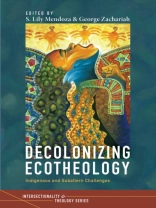Decolonizing Ecotheology: Indigenous and Subaltern Challenges is a pioneering attempt to contest the politics of conquest, commodification, and homogenization in mainstream ecotheology, informed by the voices of Indigenous and subaltern communities from around the world. The book marshals a robust polyphony of reportage, wonder, analysis, and acumen seeking to open the door to a different prospect for a planet under grave duress and a different self-assessment for our own species in the mix. At the heart of that prospect is an embrace of soils and waters as commons and a privileging of subaltern experience and marginalized witness as the bellwethers of greatest import. Of course, decolonization finds its ultimate test in the actual return of land and waters to precontact Indigenous who yet have feet on the ground or paddles in the waves, and who conjure dignity and vision in the manifold of their relations, in spite of ceaseless onslaught and dismissal. Their courage is the haunt these pages hallow like an Abel never entirely erased from the history. May the moaning stop and the re-creation begin!
Circa l’autore
George Zachariah is Wesley Lecturer in Theological Studies at the Trinity Methodist Theological College in Auckland, New Zealand. His publications include The Word Becoming Flesh (2021), Faith-Based Health Justice (coeditor, 2021), and Alternatives Unincorporated (2014).







![Copertina di Brian Schrag & Julisa Rowe: Community Arts for God's Purposes [Chinese] 貼近神心意的社群藝術 Copertina di Brian Schrag & Julisa Rowe: Community Arts for God's Purposes [Chinese] 貼近神心意的社群藝術](https://static.worldofdigitals.com/thumb_webp/740/9781645083740.webp)




